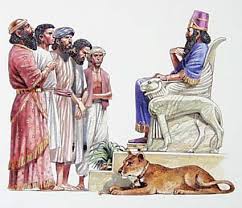Nebuchadnezzar Dreams of an Image
Dani’el 2: 1-23
Nebuchadnezzar dreams of an image DIG: What does the king ask of the magi enchanters, sorcerers and astrologers? Why is he testing their competence? Why is he so firm? So angry? In his fury, what does the king decide to do? How does Dani’el respond to the edict? Embracing the death-defying dare to interpret the dream, what role is played by Daniel’s personal faith? What does Daniel’s psalm in verses 20-23 express? What gifts does he praise God for? Why? What does that say about God? About Dani’el? About intercession, thanksgiving and counting our blessings? Why does Dani’el especially praise God’s wisdom and might? How does this relate to the king’s and magi’s claim? Compare Dani’el and this king to Joseph and Pharaoh (Genesis 41:1-57). How are they alike? Different?
REFLECT: How (or what) drives you crazy with demands? How do you decide when to give in and when to say no? Dani’el was given wisdom. Nebuchadnezzar had power. Who in your life or society claims to have wisdom or power? How do their claims compare to God’s gifts to us? How may your prayer life reflect Daniel’s praise and thanksgiving? And his friend’s powerful intercession?
602 BC during the eleven-year reign of Jehoiakim
Elizabeth Elliot (1926-2015) was twice widowed, first by the martyr death of missionary Jim Elliot, and then by the death of her second husband, theologian Addison Leitch. She tells of how helpful the Apostles’ Creed was to her as she mourned the loss of Doctor Leitch. She used it to answer the question: What things have not changed even though my husband has died? One might imagine Dani’el and his three friends asking a similar question after being hauled off to Babylon (to see link click Ca – Jehoiakim Ruled For 11 Years from 609/608 to 598 BC), far from Judah and all that was near and dear to them. They might have wondered, “What has not changed even though we have been carted off to Babylon?” And the text of Dani’el answers the question: ADONAI.229
It has been said that when kings suffer bad dreams, ADONAI is at work (see the commentary on Esther Be – That Night the King Could Not Sleep).230 And so it was with the king of Babylon. In the second year of his reign, Nebuchadnezzar had a number of dreams that night; but one in particular troubled him so much that he could not sleep (Dani’el 2:1). It was during this time that God begins to reveal to Dani’el the time of the Gentiles (see the commentary on Revelation An – The Times of the Gentiles) and the four kingdoms (see Ds – Dani’el Interprets Nebuchadnezzar’s Dream) that control that time.

The demand of King Nebuchadnezzar and his unique challenge to the wise men: So the king summoned the magi, enchanters, sorcerers and astrologers to tell him what he had dreamed (Dani’el 2:2a). They were the first to speak because of their “supposed” powers of divination. When they came in and stood before the king, he said to them, “I have had a dream that troubles me and I want to know what it means” (Dani’el 2:2b-3). Now Nebuchadnezzar uses the singular for dream. Although he had had several dreams, only one of them really troubled him.
Then the magi, who served as the spokesmen for all four groups, answered the king in Aramaic, “May the king live forever! Tell your servants the dream, and we will interpret it” (Dani’el 2:4). This was the normal procedure for interpreting dreams at that time. At this point the book of Dani’el, he switches to Aramaic from the Hebrew and continues in Aramaic until the end of Chapter 7. This was either their native tongue or the diplomatic language of the time, like Latin in the middle Ages. The Arameans were a highly important branch of the Semitic world, living mainly in Mesopotamia and Syria. Their language comprised many dialects.
But because this dream so agitated the king, he replied to the magi, “This is what I have firmly decided: If you do not tell me what my dream was and interpret it, I will have you cut into pieces and your homes turned into piles of rubble.” He wasn’t going to trust their interpretation of the dream unless they told him what the dream actually was. He wasn’t going to play by the normal rules of interpretation. This must have been terrifying to the magi because the cruelty of the Babylonian kings is well known. “But if you tell me the dream and explain it, you will receive from me gifts and rewards and great honor. So tell me the dream and interpret it for me” (Dani’el 2:5-6).
Once more they replied, please follow the normal procedure: Let the king tell his servants the dream, and we will interpret it (Dani’el 2:7). The change to the third person indicates a more respectful tone of address.
Then the king accuses them of stalling: I am certain that you are trying to gain time, because you realize that this is what I have firmly decided: If you do not tell me the dream there is only one penalty for you. You have conspired to tell me misleading and wicked things, hoping the situation will change. Unless they can tell the dream without his help, he will not believe their interpretation. Because, he asserts, it will be an invention on their part, spoken in the hope that the passage of time will obliterate the dream from the king’s memory and save them from certain death. So then, tell me the dream, and I will know that you can interpret it for me (Dani’el 2:8-9). Nebuchadnezzar knew his dream and only their declaration of the specific content of the dream would serve as proof of their claim to interpret it.
Thinking the king to be unreasonable, the magi answered the king, “There is no one on earth who can do what the king asks! No king, however great and mighty, has ever asked such a thing of any magician or enchanter or astrologer.” What he was asking violated Babylonian tradition. What the king asks is too difficult. No one can reveal it to the king except the gods and they do not live among us (Dani’el 2:10-11). This is a loaded theological statement.
This made the king so angry and furious that he ordered the execution of all the wise men of Babylon. Nebuchadnezzar was about to wipe out the entire school of magi, of which Babylon was so famous. And among the ones to be killed were Dani’el and his three friends because, from the Babylonian perspective, they were a part of the magi. So the decree was put into writing and was issued to put the wise men to death, and men were assigned to put the wise men to death, and men were sent to look for Dani’el and his friends to put them to death (Dani’el 2:12-13). At this time Nebuchadnezzar didn’t have much spiritual insight. Because the king noticed the great abilities of Dani’el, Hananiah, Mishael and Azariah he elevated their position among the magi (Dani’el 1:17-21). But now, because of their association with that school of the magi, they were also sought to be killed.
God revealed the mystery to Dani’el: When Arioch, the chief of the executioners, had gone out to put to death the magi of Babylon, Dani’el spoke to him with wisdom and tact. He asked the king’s officer, “Why did the king issue such a harsh decree?” Arioch then explained the matter to Dani’el. At this, Dani’el went in to the king and asked for time so that he might interpret the dream as well as the content for him (Dani’el 2:14-16). Whereas the magi of Babylon were asking for time, Dani’el was asking for an appointment. He was that confident that God would reveal the king’s dream to him. However, Dani’el didn’t merely hope for the best . . . he prayed.

Then Dani’el returned to his home to seclude himself and explained the matter to his friends Hananiah, Mishael and Azariah so they could pray together. He urged them to pray also and to plead for mercy from the God of heaven, concerning this mystery, so that he and his fiends might not be executed with the rest of the magi of Babylon. During the night the mystery was revealed to Dani’el in a vision. Then Dani’el praised the God of heaven (Dani’el 2:17-19), because no human wisdom was of any help in the crisis, and praised ADONAI, saying:
The content of Dani’el’s prayer has parallels elsewhere in the TaNaKh, showing that he was well versed in whatever Scriptures were available to him at that point. Praise be to the name of God for ever and ever; wisdom (He is omniscient) and power (He is omnipotent) are His (see also First Chronicles 29:11; Job 12:13 and 16; Psalm 113:1-2). YHVH is sovereign so He changes times and seasons. He controls the affairs of the kingdom of men. He deposes kings and raises up others. Human history and natural phenomena are subject to His divine control. He gives wisdom to the wise and knowledge to the discerning (also see First Chronicles 29:12; Job 12:18-21; Psalm 31:15, 75:6-7). He reveals deep and hidden things as He had just done to Dani’el; He knows what lies in the darkness no matter how pitch black in may be because light dwells with Him (also see Job 12:22; Psalm 36:9, 139:12). You I thank! You I praise! For past blessing, God of my ancestors: You have given me wisdom and power. For present blessing, You have made known to me (singular) what we asked of You, You have made known to us (plural because four of them prayed) the dream of the king (Dani’el 2:20-23).
After the resurrection of Jesus Christ and the completion of the divinely revealed record, God now speaks to us through His completed revelation, the sixty-six books of the Bible, rather than through sporadic dreams or prophetic utterances. But does that make Dani’el 2 irrelevant to us? Not at all. We live in an increasingly complex and confusing world. With every new and improved technological advance, we are told that our lives will be simpler and easier. That’s the hype, but when we buy our computer, log onto the Internet, or get out our cell phone or pad, we find a whole host of new questions and challenges facing us there. Where will we find the wisdom necessary to live in a world of growing complexity? Many think it is through intelligence, which is often confused with wisdom. To get along in the world of technology, even to get a decent career, some think that knowledge, advanced degrees, and high IQ’s are the ticket to success and happiness in the world. But this is all foolishness because it misses the point.
The answer is a relationship with Yeshua Messiah and the power of the Spirit of God. We live in a confusing and troubled world. But we can gain wisdom in conversation with Him. And how do we converse with the Lord? Through prayer and reading His Word (Second Timothy 3:16). Through prayer we enhance our relationship with Him through praise, and we draw on His wisdom through sharing our problems and confusion. We then listen to His answer as He speaks to us through the Scriptures and the Ruach Ha’Kodesh.231



Leave A Comment